#alongside your typical mist manipulation and magic
Explore tagged Tumblr posts
Text
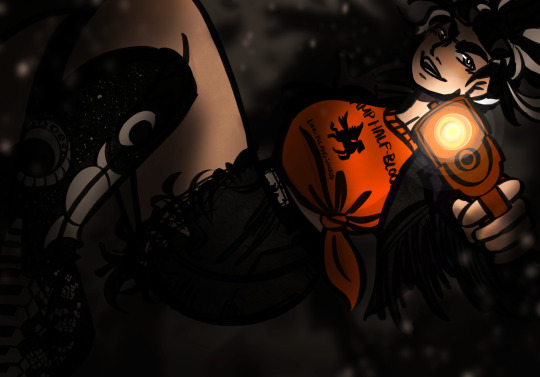
“Who’s afraid of the dark?”
#guys idk how to render shadow magic help#anyway since ophelia is the daughter of hecate she’s got shadow powers#alongside your typical mist manipulation and magic#ophelia out here being magic and casting spells before she just whips out a gun and shoots the bad guy#pjo#percy jackson oc#oc: ophelia pham#art#tw gun#magnolia draws
13 notes
·
View notes
Text
5e Viego, the Ruined King build (League of Legends)
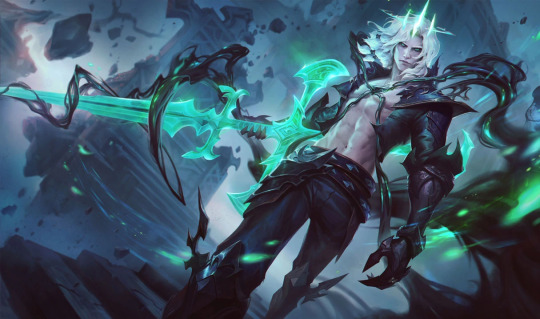
(Artwork by Pan Chengwei. Made for Riot Games.)
What? Did you expect me not to make this? It’s the goddamn Ruined King! He’s finally out after all these years! I mean sure he’s a goddamn twink but still; he’s finally out! Also Samira build is coming out 35 years from now.
And even though I put a Warlock TikTok meme in my last video, here’s a whole bunch of them because... yeah no shit he’s a Hexblade... Of the Ruined King.
youtube
GOALS
Ruin to all! - MIST'S EDGE: Basic attacks deal a percentage of the target's current health bonus physical damage on-hit.
Serve me in death - If you ever wanted to play as the enemy for a bit Viego will let you take a ghost or two; as a treat.
The mist is my great unending sadness - Foggy days are typical for an edgy boy, and King Ruin is so edgy he wants to cover the entire world with fog! Yeah that “mist is sadness” quote is real; I got it from the Wiki.
RACE
Viego is a human... but he has a great degree of variance. We’ll be going for yet another Variant Human because we’re not allowed any monster champions anymore. As a Variant Human you get a +1 in two different stats of your choice: increase your Charisma and Strength by 1 for the strength to be beautiful for your queen. You also get proficiency in a skill of your choice: Perception will let you see through the mist and search far-and-wide for your queen. And you get a language of your choice: Abyssal seems reasonable to speak to the mist.
Of course the main appeal of Variant Human is the feat at level 1, and to swing the Blade of the Ruined King Great Weapon Master will let you cut through a percentage of the enemy’s health! When you make a melee attack with a heavy weapon (such as a greatsword), you can choose to take a -5 penalty to your hit chance. If you do hit you’ll do an extra 10 damage with your strike! And as an added bonus when you score a critical hit (with a melee weapon) or kill a creature, you can make one melee weapon attack as a bonus action!
ABILITY SCORES
15; CHARISMA - League of shirtless anime boys amIrite? Gotta look good for Isolde.
14; DEXTERITY - Repeat after me: “something something Medium Armor.”
13; STRENGTH - This is a requirement for another one of the classes we’ll be taking. Yup this isn’t just straight 20 levels in Hexblade!
12; CONSTITUTION - A ruined king with a blackened heart is still allowed to have some health.
10; WISDOM - Destroying the entire planet just to simp for your wife isn’t the wisest move.
8; INTELLIGENCE - Nor is it the smartest.
BACKGROUND
You were the king of a long-forgotten nation, so unfortunately noble wouldn’t work. But you still have servants! The Knight background grants proficiency in the History that you lived through as well as Persuasion to get Isolde back. You also get proficiency with a Gaming Set and Language of your choice, which I’d say pick your fancy.
But the main reason we’re taking Knight (and not Noble) is for Retainers! You get three knights sworn to your kingdom (Kalista, Hecarim, and the third one) who will do mundane tasks for you. While Hecarim may be up for a slaughter unfortunately your retainers can’t do anything in combat and won’t follow you into dangerous locations. And of course if you treat your subjects poorly they will leave you. But it can always be useful to have more spirits in the mist to search for her!
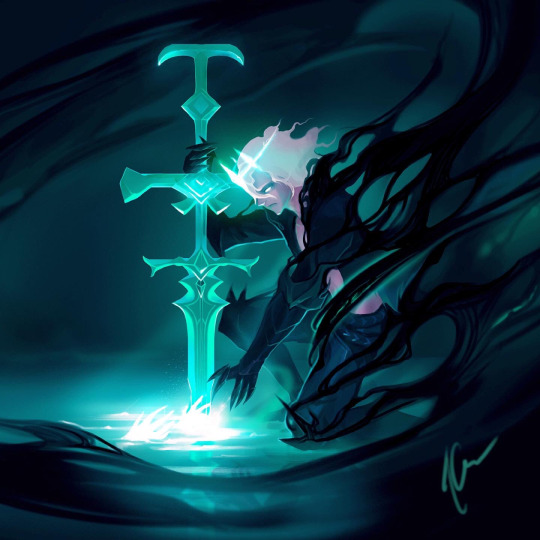
(Artwork by @thejenneralchen on Twitter)
THE BUILD
LEVEL 1 - PALADIN 1
Hah! Did you think we’d be starting with Warlock? Put simply we need things from Paladin more, notably the proficiencies as well as starting equipment. Dude imagine having to spend 3200 gold to buy the sword literally named after you? But for now you might just want to grab a Longsword to start. Regardless Paladins get proficiency in two skills from the Paladin list: Athletics are required in the jungle, and Intimidation will let everyone meet know that you will stop at nothing for her! You fucking simp...
You also get Divine Sense to sense the beasts of the mist, or your queen. As an action you can know the location of any celestial, fiend, or undead within 60 feet of you that is not behind total cover. You know the creature type, but not its identity. Within the same radius, you also detect the presence of any place or object that has been consecrated or desecrated. (Have a feeling you’ll find a lot of desecrated areas.) You can use this feature a number of times equal to your Charisma modifier plus 1, and regain all uses at the end of a Long Rest.
And you can restore a bit of health thanks to Lay on Hands. You have a pool of healing equal to 5 times your Paladin level that comes back at the end of a Long Rest. You can heal a creature for any number of hitpoints from that pool as an action when you touch them, or cure a disease / poison affecting them with 5 hitpoints. Man that would’ve been useful a couple of thousand years ago, huhn?
LEVEL 2 - WARLOCK 1
Time to pick up the Sword of the Ruler of the Mist. Hm... There has to be a better way of saying that. Regardless Warlocks get to choose their subclass at level 1 and to get a comedically large sword that saps peoples’ lifeforce we’ll be opting for the one, the only Hexblade patron! As a Hex Warrior you can wield martial weapons as well as medium armor (which you already could cause Paladin), but can also choose to swing a sword with your Charisma instead of your Strength or Dexterity. Which is great because you’re not exactly the buff sort. Unfortunately you can’t use a two-handed greatsword just yet, which is why I said you’d do good to grab a longsword instead.
But if you are locked in combat Hexblade’s Curse will make sure that you can dispose of them quickly. As a bonus action you can mark a target for 1 minute. During that time you do bonus damage equal to your proficiency bonus to the cursed target, crit on a 19 or a 20, and regain hit points equal to your warlock level + your Charisma modifier when you kill them. The curse ends early if the target dies, you die, or you are incapacitated.
And of course as a Warlock you get Pact Magic. You learn two cantrips and two leveled spells: Eldritch Blast will let you manipulate the mists for a ranged attack, and Prestidigitation will help you keep clean and kingly despite all the black mist flowing out of that gaping stab wound in your chest. As for leveled spells Armor of Agathys will let you put on some Thornmail to keep your health up and hit your foes back, and I mean Shield is on the Hexblade expanded spell list anyways so we may as well use it.
LEVEL 3 - WARLOCK 2
Second level Warlocks get Eldritch Invocations as the mist manipulates your body and soul. For now take Devil’s Sight to see through your Harrowed Path with your dumb human eyes, and we’ll be leaving the other invocation slot open for a level.
You also get another spell but all the other first level spells don’t really interest me. Yeah we’re not taking Hex you’re going to have to live with it!
LEVEL 4 - WARLOCK 3
Third level Warlocks get their Pact Boon for a particular tool of the Warlock trade, and to wield a weapon of spectral steel grab Pact of the Blade! The long and short of it is you can make yourself any melee weapon, and Hex Warrior affects any weapon you summon with this feature! This means that you can actually wield a two-handed Greatsword, but feel free to choose other options. Especially now that you can take the Improved Pact Weapon invocation to turn that Cutlass of the Twink King into a +1 weapon, and also summon yourself a gun (shortbow / longbow / light crossbow / heavy crossbow) if you so desire. But I mean, why would you when you have Eldritch Blast?
You can also add some second level spells to your list like Darkness to walk a Harrowed Path through the mist, though remember that even if you can see through the mist your allies probably can’t. And Misty Step, because something something Flash.
LEVEL 5 - WARLOCK 4
4th level means the first of many Ability Score Improvements. Charisma is used for everything that you do so... maybe increase that?
You also get another spell and another cantrip! For your cantrip Mage Hand is helpful to manipulate the mist to grab things from high places. As for leveled spells Blur is on the Hexblade list... but why would you take that instead of Mirror Image, which doesn’t require Concentration.
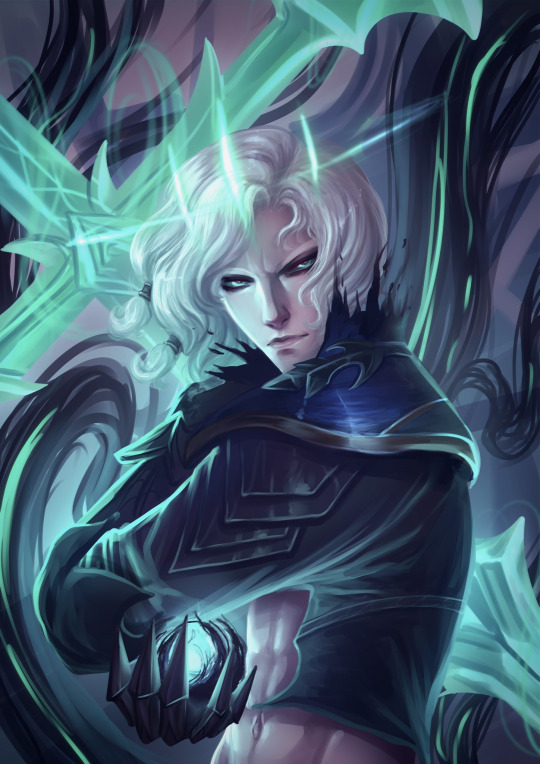
(Artwork by @WetHamster1 on Twitter)
LEVEL 6 - WARLOCK 5
5th level Warlocks get more Eldritch Invocations. To knock a foe down with Spectral Maw take Eldritch Smite, letting you channel a spell slot into a particularly deadly slash of your Viego’s Edge.
If you want an extra attack early you can also replace Improved Pact Weapon with Thirsting Blade, which is now available. But we will be getting Extra Attack from other sources later.
You can also now learn third level spells like Vampiric Touch for a bit of lifesteal. As a treat.
LEVEL 7 - WARLOCK 6
6th level Hexblades can put their passive to work, and have spirits serve your Sovereign's Domination. Accursed Specter lets you use the soul of a humanoid you killed and make it serve you, using the stats of a specter with temporary hit points equal to half your Warlock level and a bonus to hit equal to your Charisma modifier. The specter remains in your service until the end of your next long rest, which is good because you can use the ability once per Long Rest. The specter rolls initiative separately from you, and obeys your commands.
And hey: you’ve already got ghosts fighting for you, so why not summon your depression to fight as well? Summon Shadowspawn from Tasha’s Cauldron of Everything (requires a 300 gold gemstone containing tears and) summons a spirit of Fury, Despair, or Fear to fight alongside you. There’s a lot of specifics to this spell that I don’t want to go into (its actual description does a far better job than I ever could) but the important thing to note is that it’ll give you another loyal follower.
LEVEL 8 - PALADIN 2
Time for a few levels in that other class we have. Second level Paladins can choose their Fighting Style and of course to swing a Shank of the Former Blessed Isles Great Weapon Fighting (style) will let you reroll low die to more reliably cut through the mists.
Paladins also get Spellcasting at level 2, and unlike with Warlock casting you actually get some spell slots! You can prepare a number of spells equal to your Charisma modifier plus half your Paladin level (rounded down.) Divine Favor will let you do a bit more damage with your titular blade, and if you want more of a burst of damage then either Thunderous Smite or Wrathful Smite will do some more damage along with additional effects. To protect yourself from the mists and others who’d want to keep you from Isolde take Protection from Evil and Good. And to borrow a death realm from the other world-ending lord of Runeterra take Compelled Duel.
Of course you could ignore all that spellcasting stuff for even more Damage of the Ruined Blade! Divine Smite will let you do 2d8 damage with a first level spell slot, plus an additional 1d8 per spell slot above first, up to a maximum of 5d8 (with a 4th level slot.) Additionally if you hit an undead or fiend you’ll do an extra d8, meaning that with a 4th level spell slot you can do 6d8 damage!
The real neat thing is that this works with Smite spells as well as the Eldritch Smite invocation, allowing you to effectively use two spell slots at once to smite if you so desire.
LEVEL 9 - PALADIN 3
3rd level Paladins get to choose their Divine Oath and nothing will stop your Oath of Conquest to save your queen. You get to add the Command spell to your spell list, as well as Armor of Agathys... Uh woups. Uh we’ll address that when we go back to Warlock.
You get two Channel Divinity options: to keep others from stopping you from reaching your queen Conquering Presence will let you force a Wisdom save on units of your choice within 30 feet to frighten them! Alternatively Guided Strike is like Great Weapon Master but in reverse, giving you +10 to hit. This means that if you use Great Weapon Master as well you’d have a +5 to hit and do +10 damage! But remember that you only have one Channel Divinity per short rest.
You also get Divine Health, because simps don’t take sick days.
LEVEL 10 - PALADIN 4
4th level Paladins get another Ability Score Improvement, and we still use Charisma for basically everything so with this you can cap it off completely!
You can also prepare two more spells but... there isn’t much I want from first level? I mean you can take Cure Wounds for a bit of healing... as treat.
LEVEL 11 - PALADIN 5
5th level Paladins get an Extra Attack. If you took Thirsting Blade from Warlock you might want to replace that too.
You can also prepare second level Paladin spells now! As a Conquest Paladin you get Hold Person to stun with Spectral Maw, and Spiritual Weapon for more soldiers from the mist. You can also prepare Aid to strengthen your army and Branding Smite to see your foes through the mist.

(Artwork by @vmatbox on Twitter)
LEVEL 12 - WARLOCK 7
Back to Warlock to replace a lot of things. But firstly you get another Eldritch Invocation: take Trickster's Escape for an emergency QSS.
You also get 4th level spells like Shadow of Moil to become a creature of the mist, and also to get an upgrade from the Darkness spell (which you might want to replace.) Speaking of replacing spells: you got Armor of Agathys from Paladin so replace it with Hallucinatory Terrain to cover the land with mist.
LEVEL 13 - WARLOCK 8
8th level Warlocks get another Ability Score Improvement or a Feat. We’ll be taking the Eldritch Adept feat for more Eldritch Invocations. Which Eldritch Invocation? Why Undying Servitude of course, for more servants of the mist!
D&D Beyond tip: Replace Devil’s Sight and then give yourself 120 feet of Darkvision on the sheet.
You can also get another 4th level spell like Dimension Door, to travel far and wide in a flash to reach your queen.
LEVEL 14 - WARLOCK 9
Hey more Eldritch Invocations! Whispers of the Grave will let you speak to the fragments of Isolde’s soul.
LEVEL 15 - WARLOCK 10
And hey: 5th level spells finally! To strike a foe with Heartbreaker take
Negative Energy Flood, sundering their health and making them rise to serve you if you end up killing them.
10th level Hexblades get Armor of Hexes. If the target affected by your Hexblade’s Curse hits you with an attack roll, you can use your reaction to roll a d6. On a 4 or higher, the attack instead misses you, regardless of its roll. Naturally this ability makes you particularly good in a 1v1 with whoever you target for Ruination.
You don’t get another spell but you do get a cantrip. Take Toll the Dead to deal with enemies who have high armor, for the mist comes for all.
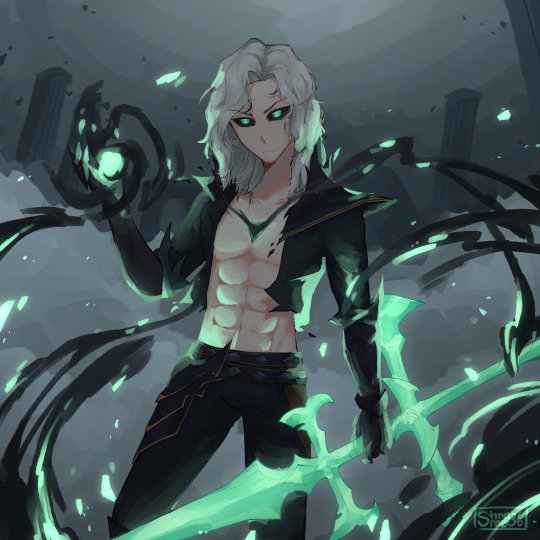
(Artwork by @stingrae36 on Twitter)
LEVEL 16 - WARLOCK 11
11th level Warlocks get their 6th level Mystic Arcanum, which looks like a spell slot and acts like a spell slot (IE it comes back after a Long Rest, not a Short one) but can’t be used to upcast your other spells. You can only use it to cast one spell, and for an AoE Heartbreaker take good ol’ Circle of Death.
Also more spells known from your regular Warlock slots: Banishing Smite is on the Hexblade list, and can be used to send any demons back to whence they came.
LEVEL 17 - WARLOCK 12
12th level Warlocks get an Ability Score Improvement or a Feat. I have no idea what else to grab so take the Tough feat for a much needed 24 hitpoint increase to a primarily melee-based character.
You also get another Eldritch Invocation so it’s finally time to get the true Blade of the Ruined King damage with Lifedrinker! This will make any foe struck by your Pact Weapon take an additional 5 necrotic damage. This means that you should be doing 2d6 + 11 damage with every swing of a (+1) Greatsword!
LEVEL 18 - WARLOCK 13
More Mystic Arcanum, this time at 7th level! Power Word Pain will let you subjugate the weak.
And more regular spells: Danse Macabre lets you get more servants forever loyal at your side!
LEVEL 19 - WARLOCK 14
14th level Hexblades are Master of Hexes. Put simply: when a creature affected by Hexblade’s Curse dies, you can apply the curse to a different creature you can see within 30 feet of you. (Though you won’t be healed for the last foe’s death.) This will let you bounce your curse around and reap all its benefits constantly, becoming a master of your own blade.
LEVEL 20 - WARLOCK 15
Our last level is the 15th level of Warlock for a handful of benefits. Firstly we can get an 8th level Mystic Arcanum: Feeblemind is the ultimate tool to truly sunder the weak and discard the chaff.
Secondly you can get your level 15 Eldritch Invocations, and to never mistake Isolde’s face Witch Sight will let you see through any illusion that may be hiding her!
You may also want to replace Improved Pact Weapon as by this point you’ve likely found something better than a regular old +1 greatsword. Visions of Distant Realms and Shroud of Shadows are both very good options.
And we can finally get our last spell: as you gather enough information on the new world Scrying will help you expand your search further beyond!
FINAL BUILD
PROS
Surrender to me! - Two smites plus Great Weapon Master on an already deadly blade results in absolutely devastating spikes of damage with your sword. God forbid you crit!
The black mist flows from me like a tide - You also have plenty of tricks to give you an upper hand in longer combats. Hexblade’s Curse of course, but also Armor of Agathys, Shadow of Moil, and Spiritual Weapon.
Fight, puppet; fight for your king! - You can summon all manner of ghosts, ghouls, skeletons, zombies, and everything in between to serve in your search for your queen.
CONS
The world denied my happiness - Low ability scores mean that your skills won’t be amazing. The ones you’re proficient in are alright but you aren’t much help outside of being deadly and being royal.
Answer for your crimes, death; answer me! - We didn’t take the 6th level of Paladin which means we didn’t get Aura of Protection. As a result your saving throws are rather low, and while I tried to avoid grabbing too many Concentration spells yo do still have quite a few, which is not at all helped by your meager +1 to CON.
She remains in this world; I can feel it - All the melee tools in the world don’t mean much when you lack any proper way to get close. You have Eldritch blast sure but beyond Dimension Door (which granted is very strong) enemies can easily keep their distance from the mad king with a big blade. Even if you want to use Dimension Door you have a very limited amount of spell slots.
But the world can only hide from the Ruination for so long. The black mist comes, and with it you come to search for your queen. Nothing can stop you; nothing will stop you until you have her again. The world shall be torn to shreds and shattered beyond repair, as long as you can have your queen... Or like, just find a Wish spell or something? Shame you’re a couple thousand years old because True Resurrection doesn’t even work anymore.
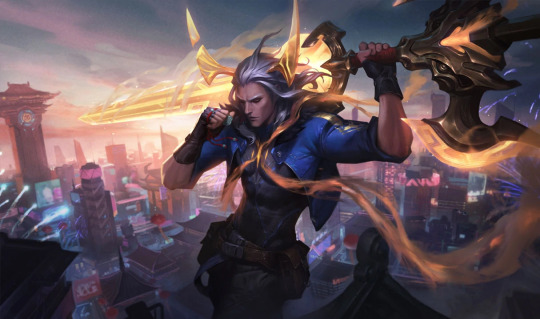
(Artwork by Bo “chenbowow” Chen. Made for Riot Games.)
#dnd#dnd build#dnd guide#League of Legends#League of Legends Viego#League of Legends Ruined King#Ruined King#LoL Ruined King#Blade of the Ruined King#dnd warlock
17 notes
·
View notes